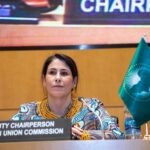By BUUMBA CHIMBULU in Luanda
THE Corporate Council on Africa (CCA) has called for the urgent renewal of two cornerstone United States policy instruments, the African Growth and Opportunity Act (AGOA) and the International Development Finance Corporation (DFC), warning that delays could stall progress in strengthening trade and investment ties with Africa.
The AGOA, which provides duty-free access for thousands of African products to the U.S market, expired on September 30, 2025 while the DFC, Washington’s key development finance arm, saw its reauthorisation lapse on October 5, 2025.
Ms Florizelle Liser, president and Chief Executive Officer of the CCA, said both programmes, which lapsed earlier this month, were critical to maintaining investor confidence and advancing Africa’s integration into global markets.
Ms Liser was speaking during a high level ministerial dialogue on upscaling development finance for connectivity and market access at the third Luanda Summit on Financing Infrastructure and Development in Africa being held in Angola.
Founded over 30 years ago, the Corporate Council on Africa represents more than 200 U.S. and African companies operating in sectors such as infrastructure, energy, finance, and healthcare.
The organisation continues to advocate for deeper U.S.-Africa economic engagement and greater private-sector participation in the continent’s development.
“AGOA and DFC are two main policy areas on the U.S. side that we need to get focused on if we’re going to make sure that Africa can trade more with a large market like the United States,” Ms Liser said.
“Despite existing tariffs, duty-free access to the U.S. market remains very important. We need AGOA reauthorised, and we need DFC reauthorised so that it can support the kind of investments U.S. companies are already making and would like to do in Africa.”
She dermine recent gains in U.S.-Africa economic cooperation and dampen investor enthusiasm.
Turning to the United States’ broader engagement on the continent, Ms Liser highlighted the role of the Millennium Challenge Corporation (MCC), which has invested over US$10 billion in African infrastructure over the past 20 years.
“In the last two decades, the MCC has invested over $10 billion in Africa, mainly in infrastructure,” she said. “A lot of people don’t realise this. While China is often cited as the dominant player, the United States and other partners have also been making significant, long-term investments that are transforming communities and strengthening trade connectivity.”
Ms Liser, who heads the leading U.S. business association dedicated to advancing trade and investment with Africa, said such investments are vital to realizing the goals of the African Continental Free Trade Area (AfCFTA) by improving regional integration and cross-border connectivity.
“For U.S. investors to come to Africa, they need larger markets and regional integration,” she explained. “The AfCFTA is being implemented, and trade among Africans is happening – but not yet at the scale it needs to be. Infrastructure is the key to unlocking that growth.”
She stressed that the lack of coordinated cross-border infrastructure and fragmented regulatory frameworks continues to deter investors and delay project implementation.
“Many infrastructure projects stop at the borders because they are planned nationally, not regionally,” Ms. Liser observed.
“To move faster, governments and development finance institutions need to harmonise standards, streamline procurement, and strengthen institutional capacity.”
Ms Liser added that reliable energy access remains one of the most pressing challenges for African industry and competitiveness.
“I have not been to one factory in Africa that did not rely on a generator,” she noted. “That alone shows how crucial energy and power infrastructure are for productivity and trade.”









